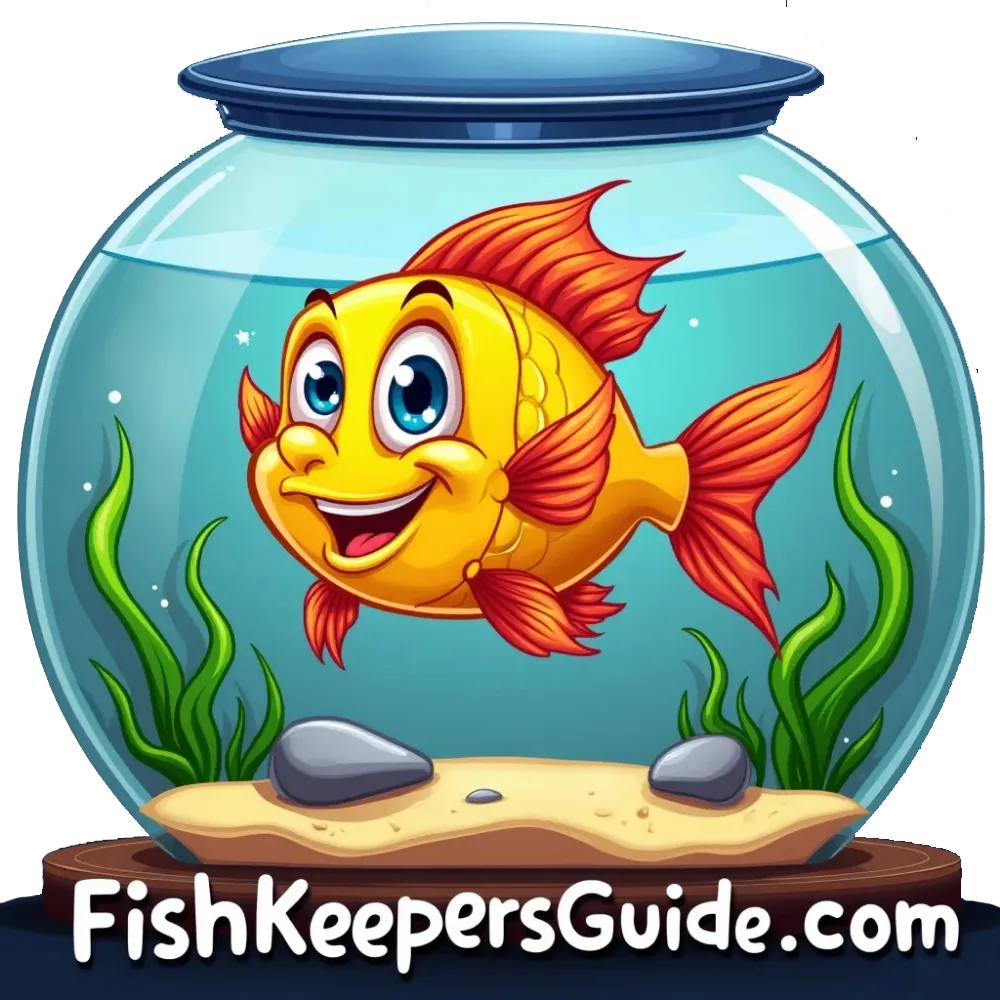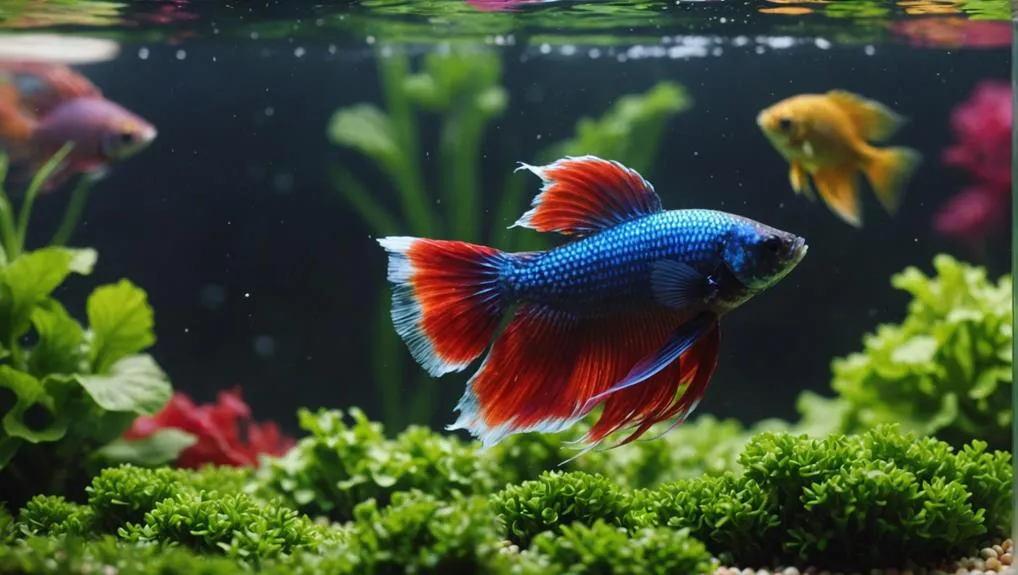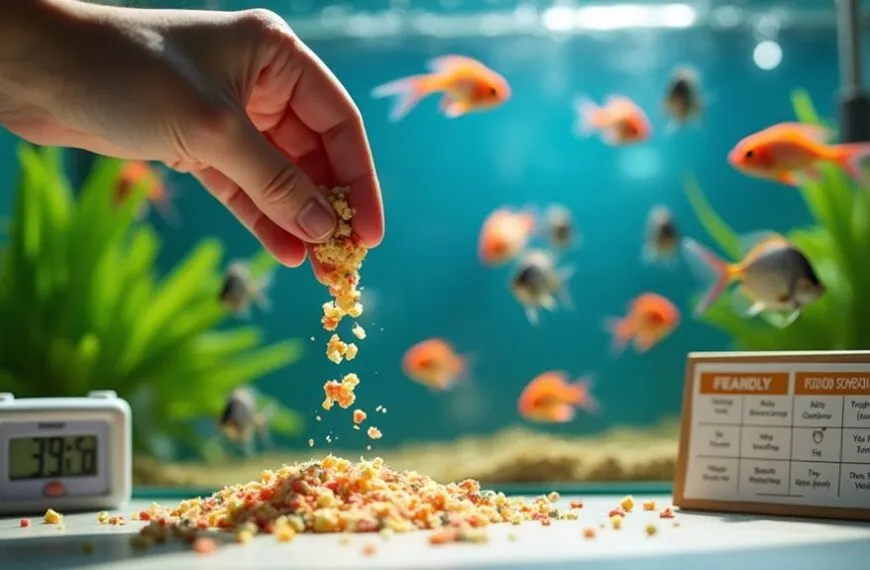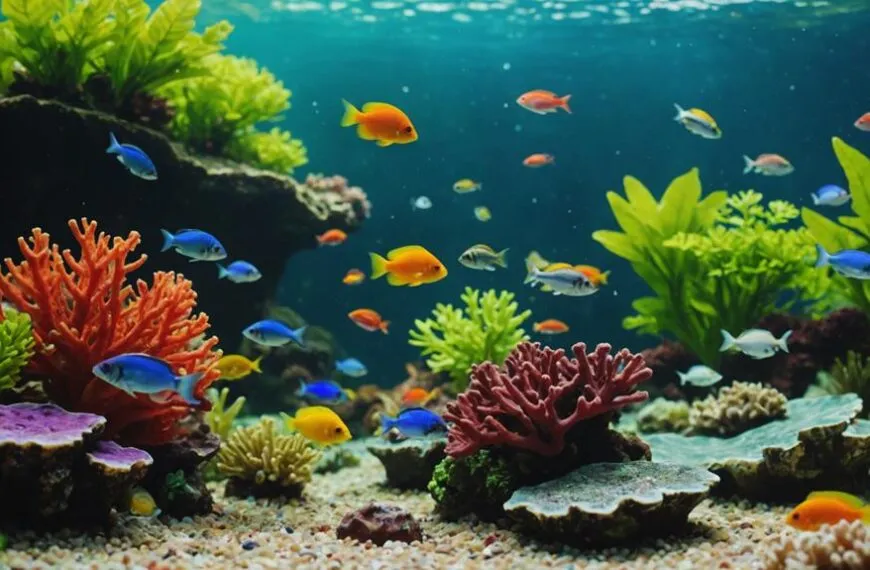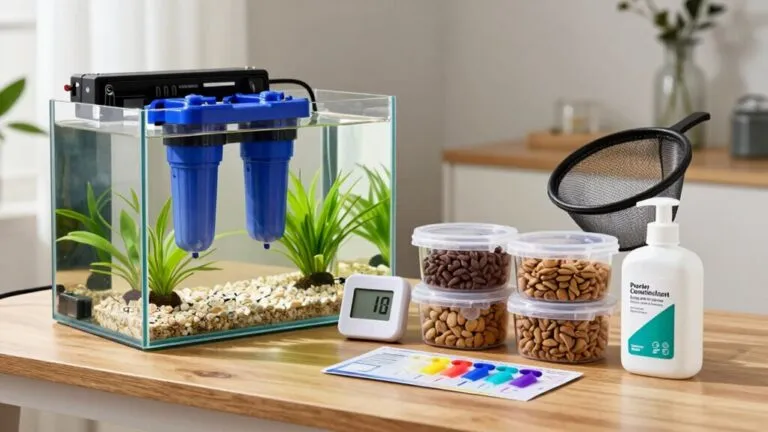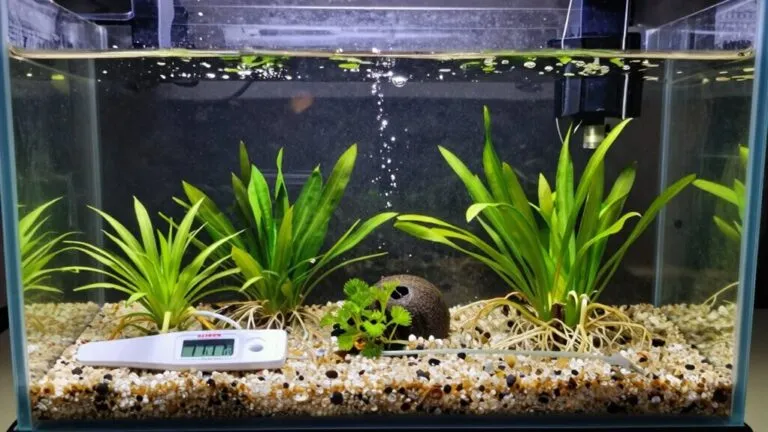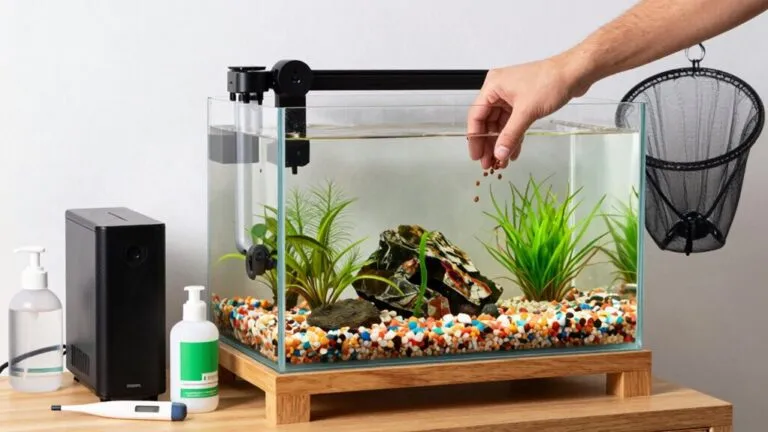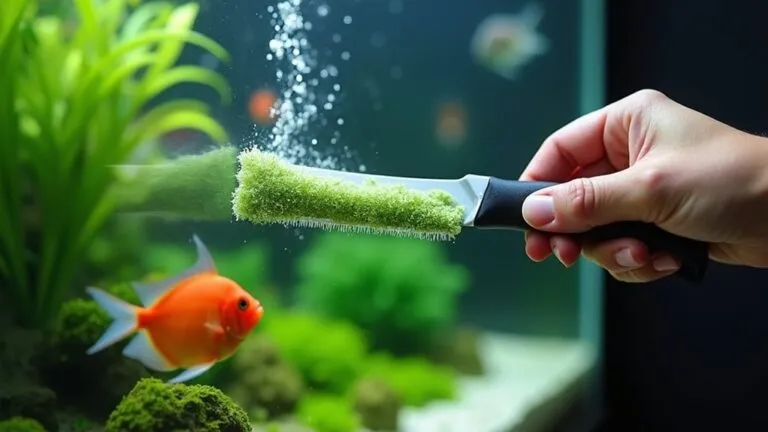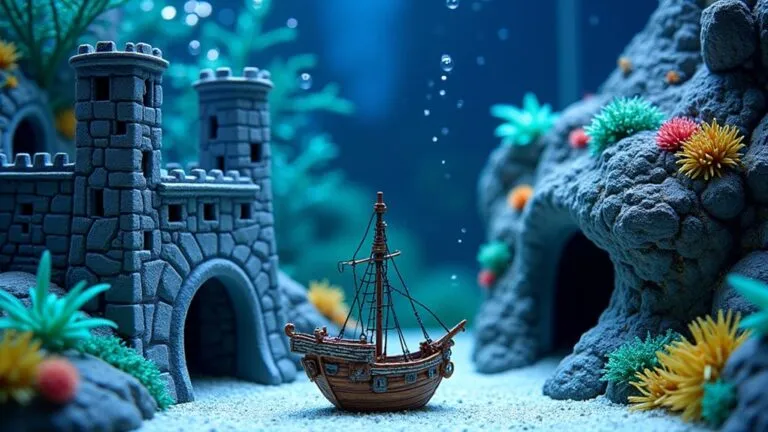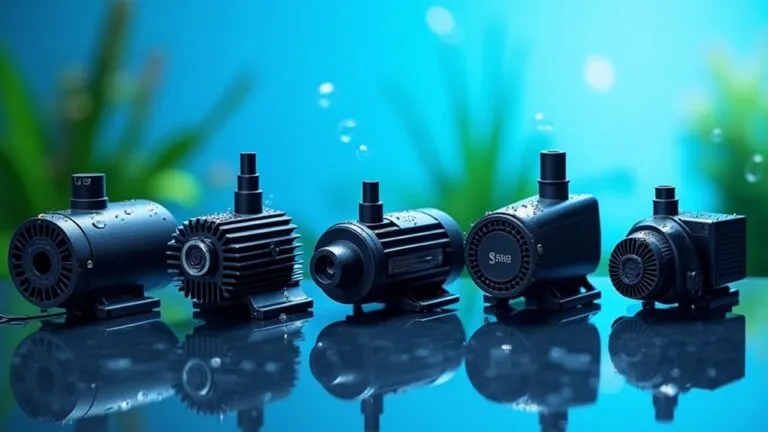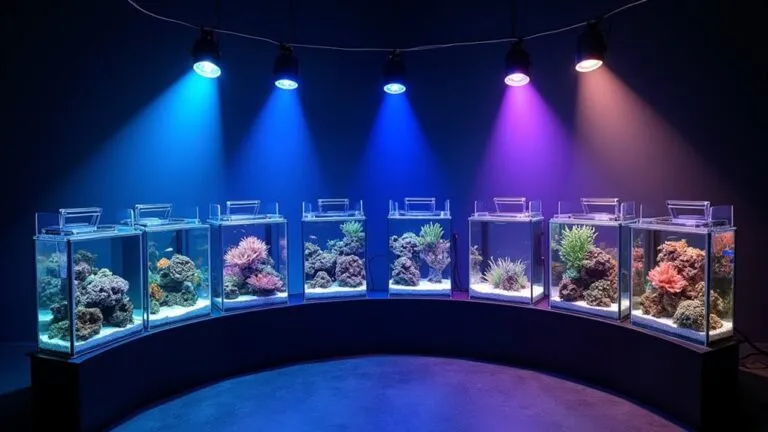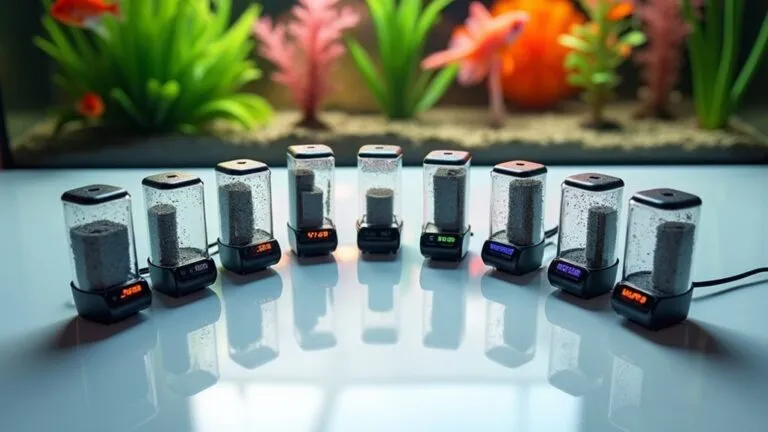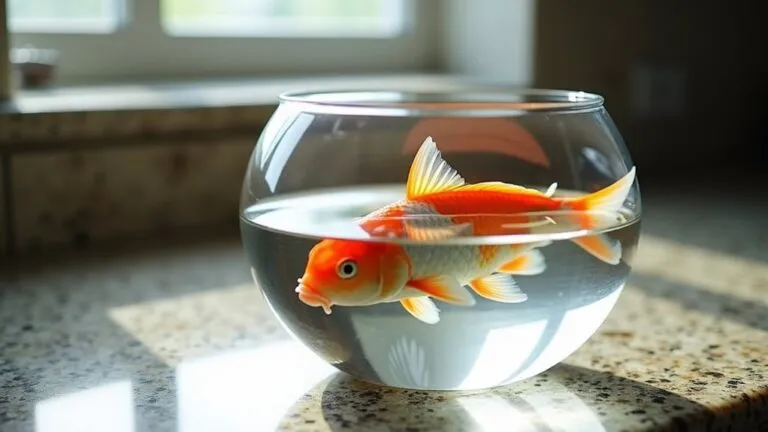To keep your betta fish happy and thriving, focus on feeding them a high-protein diet, around 30% to 40% protein, just like they'd find in the wild. Think tasty treats like high-quality pellets, freeze-dried worms, or even some live brine shrimp. It's essential to avoid fillers like wheat or corn that can upset their little tummies. A bit of variety will not only keep things interesting for them but also support their health. Just remember to keep an eye on portions, and if you stick around, you'll discover some other handy tips to help your betta flourish!
Contents
Nutritional Needs of Betta Fish
Betta fish, known for their vibrant colors and dynamic personalities, have specific nutritional needs that are essential for their health. When you're feeding your betta, remember that they're carnivores, so their diet should be high in protein—around 30% to 40% crude protein content.
In the wild, these little swimmers feast on insects and larvae, making it crucial to replicate this high-protein diet in captivity.
You'll want to steer clear of fillers like wheat and corn, as these can lead to issues like bloating and constipation. Instead, opt for high-quality feed pellets or flakes designed for bettas.
These food options should include essential nutrients a betta fish needs, such as vitamins A, D3, E, K, and various fatty acids.
Don't forget about your betta fry! They require specialized diets to grow healthy and strong, while adult bettas will thrive on a balanced diet with some occasional treats, like freeze-dried or frozen foods.
Types of Betta Fish Food
When it comes to feeding your betta, you've got a smorgasbord of options that can keep them happy and healthy!
From high-protein pellets specially made for bettas to the occasional tasty treat of freeze-dried bloodworms, there's plenty of variety to explore.
Plus, don't forget about live food choices like daphnia, which not only mimic their natural diet but also give them a bit of exercise—it's like a little workout while they eat!
Pellet Options Available
Choosing the right pellets for your betta fish is crucial for their health and vitality. When you're shopping for betta fish pellets, aim for those with high protein content, ideally between 30% and 45%.
Brands like NorthFin Betta Bits, boasting 45% protein, or New Life Spectrum at 37%, are fantastic choices.
Be cautious of fillers like corn and wheat; they can lead to digestive issues and offer less nutritional value. Betta-specific pellets are usually floating, which works perfectly for your betta's upturned mouth. This helps reduce waste in your tank, keeping things clean and tidy.
A little tip: soak those pellets in tank water for a few minutes before feeding. This simple step can help prevent bloating by stopping the pellets from expanding in your fish's belly.
Premium brands like Omega One and Hikari provide betta-specific pellets packed with essential nutrients and colorful ingredients to enhance your betta's health and appearance.
Freeze-Dried Food Benefits
In addition to pellets, incorporating freeze-dried foods into your betta's diet can significantly enhance their nutrition and overall well-being.
These treats, like bloodworms and brine shrimp, are high in protein, making them a fantastic supplement for adding variety. Plus, they're super convenient—no need for freezer storage! You can easily keep them at room temperature and portion them out as needed.
However, there's a bit of a catch: always soak them in tank water before feeding your betta. This simple step helps prevent bloating and digestive issues, which we definitely want to avoid.
Remember, overfeeding is a common pitfall, so limit freeze-dried foods to just 1-2 times a week. This way, you keep your betta happy and their digestive health in check.
Look for commercially available brands like Hikari and Omega One. They're known for providing valuable nutrition that supports vibrant color in your betta.
You'll love watching your little friend thrive, and they'll appreciate the tasty treats. After all, a well-fed betta is a happy betta!
Live Food Choices
Exploring live food choices for your betta fish can greatly enhance their diet and overall health. Live food like brine shrimp isn't only highly nutritious but also mimics what your betta would naturally eat in the wild. This protein-rich option helps keep them active and happy!
Bloodworms, those little reddish larvae, are a favorite treat, too. Available live or frozen, they offer a tasty addition to your betta's diet but remember to serve them in moderation.
Don't forget about Daphnia, or water fleas. These tiny crustaceans are nutritious and can help boost your betta's digestive health while encouraging their natural hunting behavior.
And if you want to take it up a notch, blackworms are a fantastic choice. They closely resemble your betta's wild diet, enhancing their instincts and providing a fun challenge.
Offering a variety of live food options not only enriches your betta's diet but also promotes exercise and keeps them from getting bored with their meals.
Feeding Guidelines
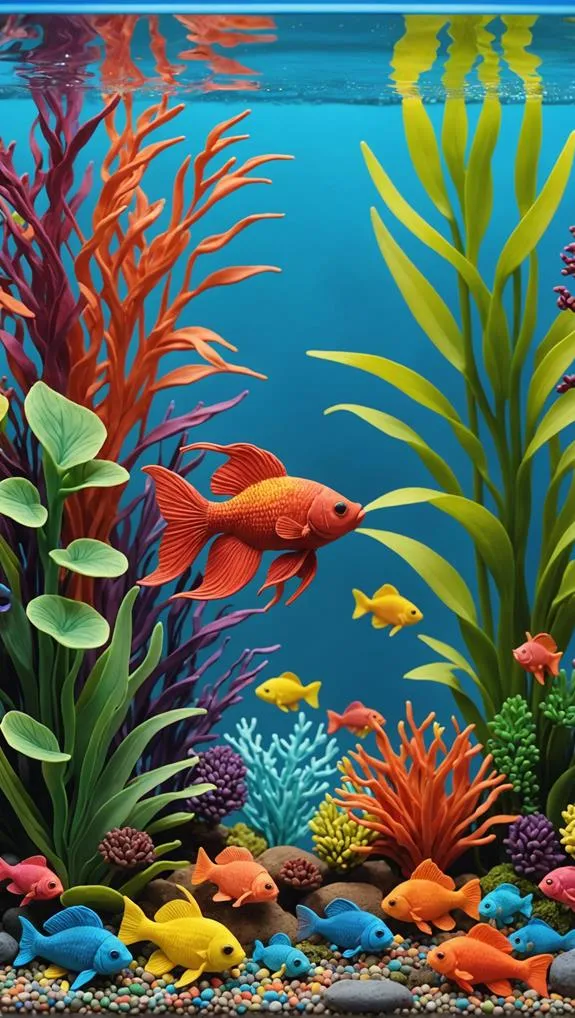
When it comes to feeding your betta fish, keeping an eye on portion control is crucial for their health and happiness.
You'll want to stick to 2-4 pellets or a few pieces of live or frozen food, and don't forget to mix things up occasionally to keep mealtime exciting!
And hey, a little fasting once or twice a week can help your betta stay in tip-top shape—just like we all need a break from snacks sometimes!
Portion Control Importance
Maintaining proper portion control is essential for your betta fish's health, as overfeeding can lead to serious digestive issues like bloating. You don't want your little buddy feeling like he's swallowed a beach ball!
For adult bettas, aim to feed them 2-4 pellets or 2-3 pieces of live or frozen food once or twice daily, depending on their appetite and activity. Starting with smaller portions lets you gauge how much they truly want, which helps avoid uneaten food that can mess with water quality.
Fasting your betta for 1-2 days each week can work wonders, too. It not only prevents overfeeding but also supports digestive health, especially for those bettas who seem to think they're at an all-you-can-eat buffet.
Keep an eye on any leftover food and remove it promptly; this helps maintain a clean tank environment and keeps your betta thriving.
Feeding Frequency Recommendations
After mastering portion control, it's time to consider how often you should feed your betta fish. Understanding your betta fish's needs is key to keeping them healthy and happy. Most adult bettas do great with once-a-day feedings, while fry need a little more love, requiring 2-3 meals daily.
You can offer them 2-4 pellets or flakes each time, keeping a close eye on portion control to avoid overfeeding.
Don't forget about the importance of a fasting period! Implementing a day or two of fasting each week can help maintain your betta's digestive health and keep them from packing on the pounds.
And if you notice any uneaten food floating around after a meal, scoop it out right away. Leftover food can mess with water quality and that's a no-go in a happy tank!
Varying your betta's meals with different types of food, like pellets, freeze-dried options, or live foods, can also ensure they enjoy a balanced diet.
Variety in Diet
Offering a variety of foods is crucial for keeping your betta fish healthy and engaged. Just like us, bettas can get bored eating the same thing every day. So, mix it up!
Consider feeding them high-quality betta pellets, but don't stop there. Include live foods like brine shrimp and bloodworms, or frozen options for a tasty treat that's packed with protein. This dietary variety not only keeps your betta happy but also supports their overall health.
For adult bettas, aim for 2-4 pellets once a day, or 2-3 pieces of live or frozen food. Young bettas, or fry, need more frequent meals to fuel their growth.
Remember to give them fasting days, about 1-2 times a week. It helps prevent issues like bloating or constipation—nobody wants that!
Keep an eye on their feeding behavior. If your betta seems to prefer certain foods, adjust accordingly. They'll appreciate the effort, and you'll feel great knowing you're catering to their tastes.
Quality of Fish Food
Choosing high-quality fish food is essential for your betta's health and vitality. When you pick the right Betta Fish Food, you're not just filling a bowl; you're fueling a vibrant life! Bettas are carnivores, so they need a diet rich in protein—aim for at least 30%-40% crude protein content.
They thrive best in a well-maintained environment, which includes proper feeding habits and optimal tank conditions, making it crucial to pay attention to their dietary needs ideal water conditions. But be wary of those sneaky fillers like corn and rice. They can cause digestive issues, and nobody wants a bloated fish!
Here are some tips to help you choose the best food:
- Look for natural protein sources like shrimp or krill.
- Avoid foods with excessive fillers that don't provide nutritional value.
- Check ingredient lists regularly to ensure they meet your betta's needs.
- Consider specialized betta pellets for the right nutrient balance.
Common Feeding Concerns
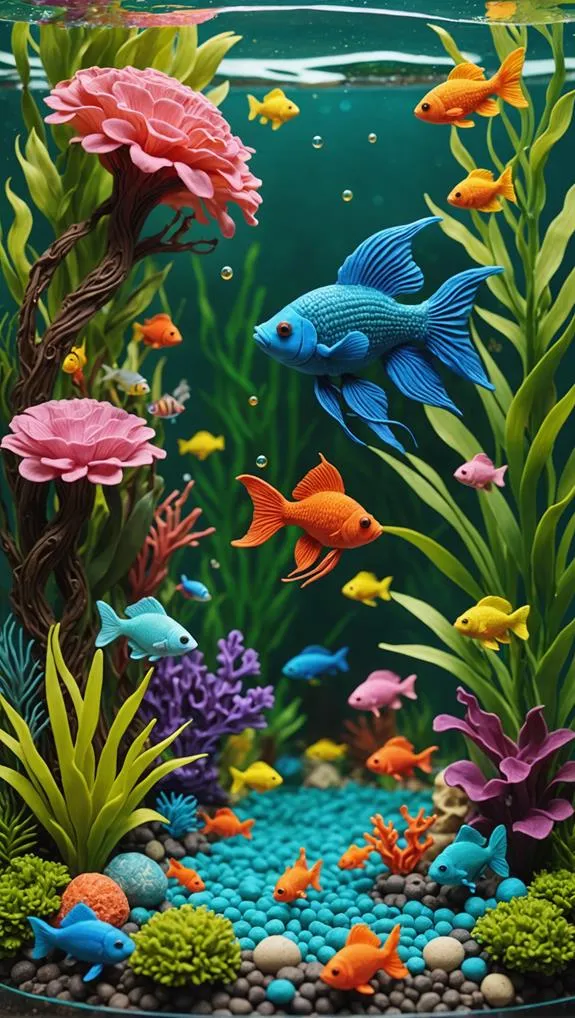
Bettas often face common feeding concerns that can impact their overall health. One major issue is overfeeding, which can lead to health issues like bloating and obesity. You need to keep a close eye on how much betta food you're giving them.
Remember, these little guys are natural carnivores, so they thrive on protein-rich food. A varied diet that includes high-quality pellets and occasional live foods is essential to keep their appetite healthy. Maintaining optimal water parameters is also crucial, as fluctuating conditions can stress your betta and affect their eating habits.
You might notice that your betta isn't eating as much, and that can be a sign of stress or even a dirty tank. Maintaining a stable tank environment is crucial for their well-being. If your betta refuses to eat consistently, it's time to switch things up and try different food brands or types.
Don't forget about fasting days! Implementing 1-2 fasting days a week can help prevent digestive problems, which are often caused by overfeeding. A little break can work wonders for their digestive system.
General Care Tips
When it comes to caring for your betta fish, maintaining a clean and stable environment is essential. A well-kept tank not only helps prevent health issues but also supports your fish's feeding habits, especially when paired with proper tank decoration that enhances their well-being.
Remember, bettas are carnivores and thrive on a varied diet. Here are some tips to enhance their care:
- Ensure your tank is a minimum of 5 gallons with proper filtration.
- Regularly observe your betta's health and behavioral changes to adjust their diet.
- Offer a mix of food options like pellets, freeze-dried, and frozen foods to keep them interested.
- Implement a fasting period of 1-2 days each week to prevent overeating, which can lead to digestive problems.
Frequently Asked Questions
What Food Is Best for Betta Fish?
For optimal nutrition balance, feed your Betta high-quality pellets, supplement with freeze-dried foods, and introduce live food. Vary protein sources to support growth stages while observing feeding habits and employing diverse feeding techniques for best results.
How Often Should You Feed a Betta Fish?
Think of your betta's feeding schedule as a delicate dance. Adjust portion sizes and feeding frequency to meet their dietary needs, incorporating fast days for health monitoring, while ensuring water quality and observing their feeding behavior.
What Can I Feed My Betta Fish if I Run Out of Food?
If you run out of food, consider emergency options like kitchen scraps. Offer protein-rich snacks such as cooked shrimp or live food options like bloodworms. Frozen food tips include peas for digestion, but keep feeding frequency consistent.
What Are the Feeding Requirements for Betta?
To ensure your betta fish nutrition, follow a consistent feeding schedule. Use high-protein pellet sizes, incorporate live food options, and frozen food types. Monitor tank conditions and water quality to promote optimal health for your fish.
Final Thoughts
In the grand aquarium of life, feeding your betta fish is like crafting a gourmet meal for a tiny king. You want to mix high-quality flakes, pellets, and occasional treats to keep him happy and healthy. Just remember, moderation is key—no one likes an overstuffed fish! By following these tips, you'll create a vibrant underwater kingdom where your betta can thrive. So, dive in and make mealtime a splashy affair, and watch your little friend swim with joy!
